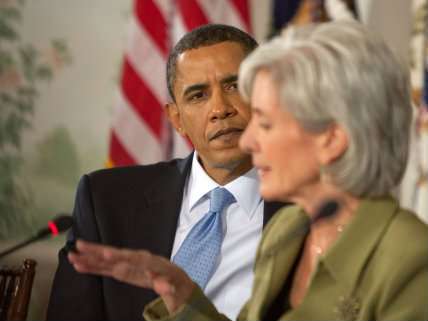Obama Administration Promises to Shift Money Around to Make Obamacare's Health Insurer Bailouts Work, If Need Be

Obamacare's defenders have responded to charges that the law creates a system of bailouts for health insurers by arguing that the bailouts may not actually be bailouts. After all, the law's risk corridors create a system of symmetrical payments in which insurers that spend somewhat more than expected on health claims get paid by the administration, but those spending somewhat less than expected must pay in. In theory, it all balances out, with some insurers paying in and others getting paid. And it's even possible that, overall, insurers will pay in more than they are paid.
Possible, yes, but far from certain. What happens if most or all of the insurers participating in Obamacare's exchanges end up with higher than expected claims, and the administration owes them all?
Well, in that case they'll find the money to pay. Somehow. As Philip Klein reports in The Washington Examiner:
Bowing to an aggressive lobbying effort by insurers, the Obama administration announced Friday it would use "other sources of funding," if needed, to finance a bailout for insurance companies if the industry racks up excessive losses through President Obama's health care law.
The news, buried in a 435-page regulatory filing by the Centers for Medicare and Medicaid Services, undermines prior assurances by the administration that the program would be budget-neutral.
There's a bit of a catch, which is that the regulation says it will use those other funding sources "subject to the availability of appropriations." And according to a recent Congressional Research Service memo, the law doesn't actually appropriate any funds for the risk corridors program. And it's a pretty safe bet that Republicans in Congress aren't going to appropriate funds any time soon (not that the administration has felt particularly constrained by the finer details of the law in the past). This could get complicated.


Show Comments (26)